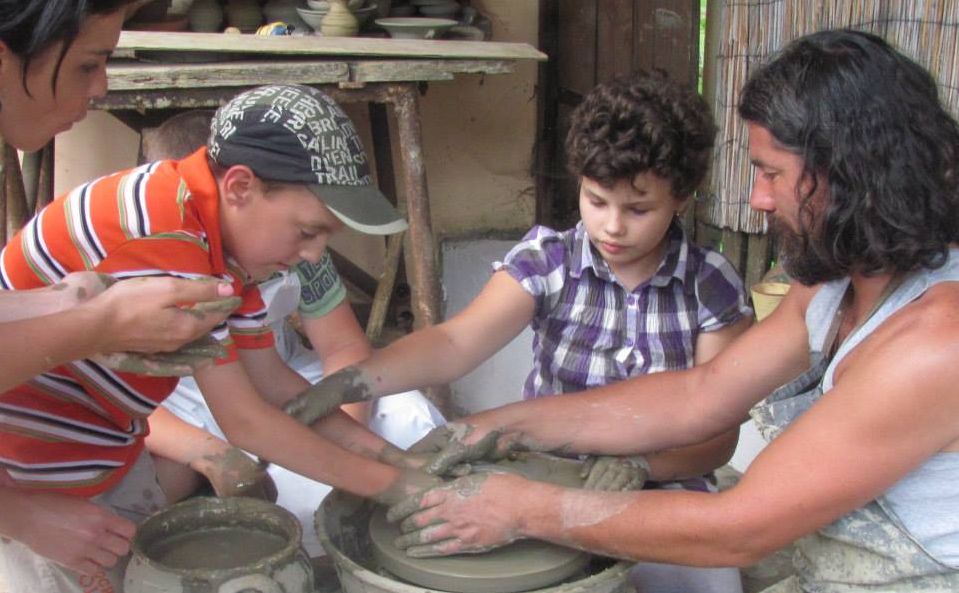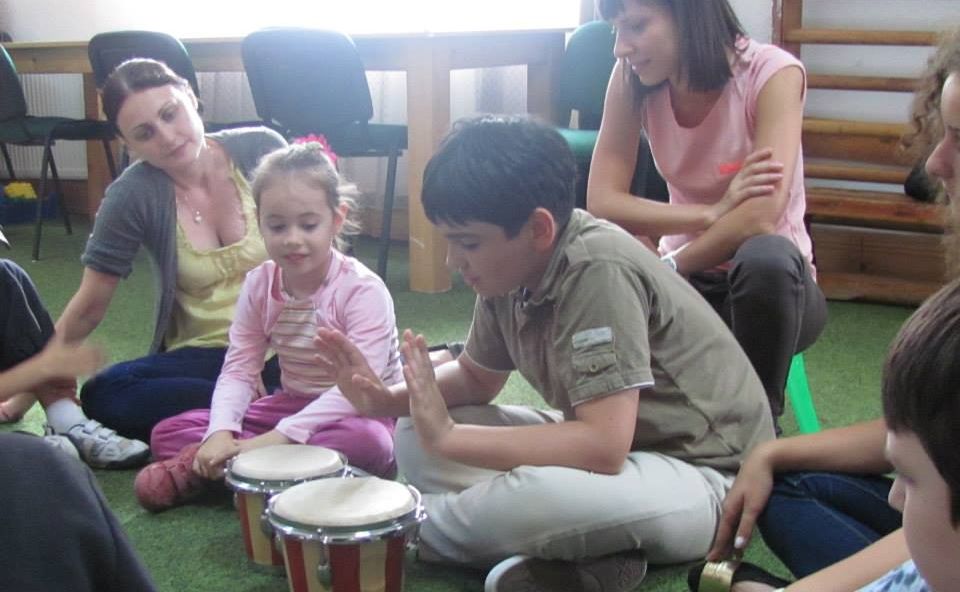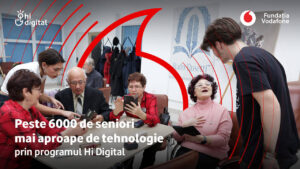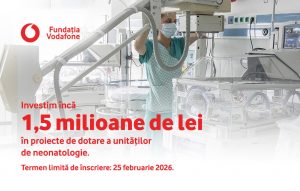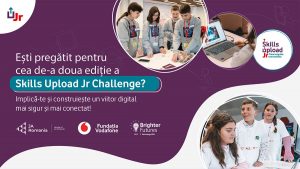The Baia Mare Autism Association has partnered with the Vodafone Romania Foundation in launching the T.A.L.E – Technology Assists Education project, which aims to improve the independent living abilities of the 55 autism-afflicted children from the Association’s Day Centre. Financed by the Vodafone Romania Foundation through the 2013 edition of the “Fund for Good Deeds”, the project is supported by the latest technology for autistic children, who will be treated through personalized methods, used to improve their verbal communication abilities.
“Children suffering from autism need diverse and customizedapproaches, in order to develop self-sufficiency, communication, cognitive and social skills, namely independent living abilities”, IolandaSztreleczukhas declared, who is in charge of the Baia Mare Autism Association’s projects.
Throughout the project, between January and December 2014, 7 tabletswill be used to facilitate the learning process for disabled children, , on which there have been installed multisensory digital applications.
The use of technology contributes to social aptitudes development through specific games and increases the learning capacity through visual, auditory and tactile stimuli.
Interview: what hopes are there for autistic children in Romania
With this opportunity, we wanted to find out more about the chances of development for the autistic children in ‘ Romania . IolandaSztreleczuk, being herself mother to an autistic child, has answered our questions, giving us details regarding autism treatments and therapies.
How does an autistic child grow into adulthood? How does an autism-suffering person fit in with the rest of society? What are the professions they usually undertake?
The development of an autistic child depends very much on a few key factors: early diagnosis and intervention (the earlier the child is diagnosed, the greater the chances of recovery), the degree of severity (there are children that besides autismalso suffer from an associated retardation, and in this case the recovery is slower and longer), the level of commitment shown by the recovery team and how involved the family is.
In Romania, autism as an affliction only started being diagnosed after 1989 and we don’t have an official record concerning the cases’ evolution into maturity. There are organizations founded by parents of adult autistic children who haven’t benefited from recovery intervention; they are being looked after by their parents or an institution. We only deal with children, but we want to be prepared for when our children become adults. Until then, we strive to offer them a possibility to develop the abilities they need in order to be independent and able to fit in.
Photo: Autistic children from the Baia Mare Association, along with master ceramist Daniel Les]
I don’t know what professions autistic adults in Romania practice, but abroad I’ve seen adults working in factories, in protected work environments, performing “serial” work. I’ve also seen adults working in greenhouses and I can tell you that, in the United States for instance, many autistic adults work in statistics or research. I hope that 10 years from now I’ll be able to tell you where the children we know look after at the centre work.
How much does the care and education of an autistic child cost?
The recovery for autism-afflicted children in Romania is very expensive, because we don’t have state-funded recovery services. There are psychologists who have opened practices or associations founded by parents that offer such services. Various projects have attempted to provide free services, but they aren’t reliable in the long run.
The cost of the recovery programdependsvery much on the child’s needs. At our centre, we offer integrated services, which include individualized behavioural therapy, speech therapy, kinetotherapy, sensory integration, music therapy, school assistance and others. The estimated cost for these services is at 2,500 lei per month. Through the projects and sponsorships received in 2013 we have managed to offer free services for 70% of our children, our goal being to offer individualized services, not starting a business.
How many autism-suffering children are there in Romania?
Recently published data shows that the number of autism cases found in Romania has significantly increased in the last few years. The statistic provided by the Child Protection Services shows that at the end of 2013 there were 6,436 children nationwide suffering from autism-related disorders. According to the estimations performed by specialized NGOs, the real number is around 30,000.
Can autistic children attend normal schools or do they need special studying conditions?
Autistic children should get an evaluation of their abilities and a customized educational route. Yes, there are autistic children who attend regular schools, but the curriculum and methods need to be adjusted. They learn in a different way, they don’t possess abilities for abstract thinking, but they may have extraordinary mathematical skills or an excellent visual memory. Some of them go to normal school with assistance from a specialized attendant, who helps them understand the tasks they are given and enables them to socialize with the other children.
Out of the cases you have encountered over time at the Baia Mare Autism Association, which oneimpressed you the most?
Each case has a life story and is unique in its own way. Autism is recoverable in a large proportion if the aforementioned factors are fulfilled. One of our children, Rareș, diagnosed at 18 months and enrolled in an adequate therapy program, while getting support from his family, too, has remarkable results. Autism symptoms are barely visible in his case.
Another child, Ovidiu, who hadn’t benefited from an early intervention, only at 14 succeeded in developing independent living abilities. Every progress, however small, achieved by these children is a source of great joy for us.
Can autistic children play sports? What kind?
Because of their need for routine, autistic children can successfully practice individual sports, such as athletics or swimming. Due to their impaired social abilities, they don’t do as well with team sports, but with the right guidance they canlearn to play even basketball, handball or football.
Group activities for autistic children
What do you think are the shortcomings of legislation and public concern regarding this disease?
Autism-specific legislation hadn’t existed until 2010, when Act 151 was voted, also known as the Autism Act. The implementation norms are still hazy. A joint effort from several institutions is needed, considering the specific nature of autism. It would be ideal if, after the early diagnosis, families could refer to integrated services IMMEDIATELY, in order to raise the child’s recovery chances. Unfortunately, there are no integrated services within public institutions, forcing parents to drag their children to psychologists, speech and kinetotherapists or doctors’ offices.
What is the worst thing that could happen to an autistic child who doesn’t benefit from special treatment?
The worst thing that can happen is the impossibility to communicate. An autistic child who learns to communicate verbally or through an alternative method becomes a cooperative child, with greater chances of recovery. At the same time, the lack of self-sufficiency and independent living abilities can affect the child’s health and safety. Recovery interventions aim to better the life-quality of autism-suffering children.
What scares us, as parents, is the uncertainty of our children’s fate when we would no longer be around to help them. The idea that my daughter Julia would be committed in an asylum or sanatorium, because she didn’t understand what was going on around her, was my strongest motivation. Now my child can conduct a conversation, she is independent, she socializes with others and attends a normal school. All of these were made possible through five years of therapy, with the involvement of highly professional specialists, who put the child’s needs before anything else.


